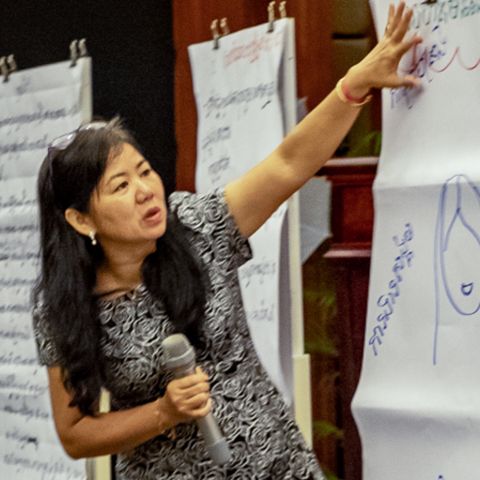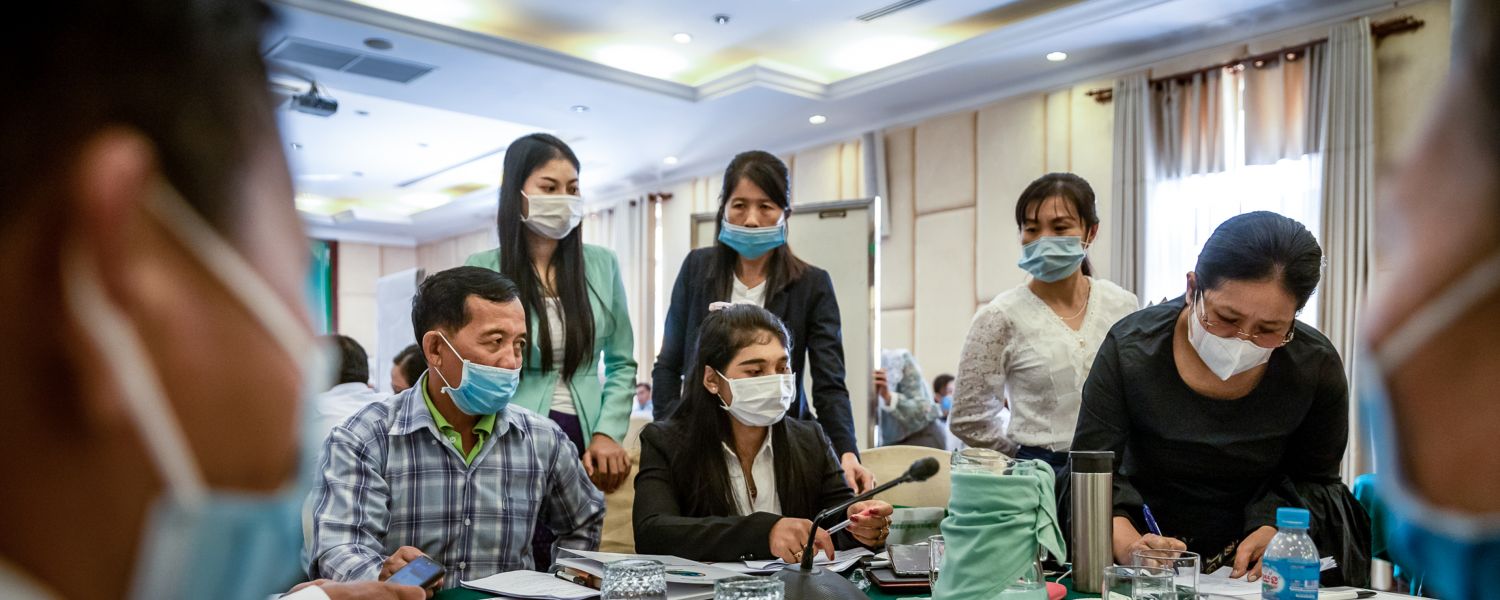

Gender leaders in Cambodia are working to mainstream gender equality in the forestry sector.
Forestry is associated with labour-intensive work. Timber harvesting, forest patrolling and fire protection take time and effort. In Cambodia, this is one of the main reasons women are not encouraged to participate in this sector. Even male family’s members won’t invite their female family members to be part of the discussion. This causes many women to believe their opinions are not valued.
Vong Sopanha, a forester who graduated in the early 1990s, is an example of a person who was sidelined because she is a woman. She was stuck in the government forestry office in Phnom Penh city because her colleagues thought it was too dangerous for her to go into the forest.
“I liked nature, and I wanted to work outdoors where I could meet different people and learn ideas from them,” Vong says about her desire to work in forestry. “But at the time, there was fighting still going on, and my male colleagues thought it was too dangerous. There were land mines in there too.”
Women are often ignored. The problem is compounded because women have fewer educational opportunities, making them self-conscious and shy when participating in discussions about community forestry.
“I do not dare talk too much,” says Nhas Tom, a community member from Koh Nhek, Mondulkiri Province, about her feelings when she tries to join discussions with male villagers. “I am afraid that I will say the wrong thing and people will laugh at me because I have little education.”
Creating space for women
Creating space for women in forestry starts with an understanding of the importance of balancing the power between men and women.

"We want women to be able to share their experiences without fear and to increase their capacity to encourage other women to lead. We also want to shift the mindset of their male counterparts so they accept the important role women can play in forest management."
Hou Kalyan, Director, RECOFTC Cambodia
“We work to create a safe environment for all members of the community,” says Hou Kalyan, director of RECOFTC Cambodia. “We want women to be able to share their experiences without fear and to increase their capacity to encourage other women to lead. We also want to shift the mindset of their male counterparts so they accept the important role women can play in forest management.”

Weaving Leadership for Gender Equality (WAVES) is a gender leadership initiative that supports and implements activities to improve gender equality in forest landscapes.
Under the WAVES initiative, RECOFTC builds and supports a network of gender equality champions.
Vong, who has worked for 30 years in the forest department is now the Deputy Director-General of Forestry Administration, and Ly Sophorn, Deputy Director-General of the Ministry of Environment, are laying the foundational policies that will underpin gender equality in Cambodia’s forestry sector.
Barriers to gender equality are also found in policies and regulations. Many statements lack a gender perspective and contain criteria that are difficult for women to fulfill. Vong and other gender champions led the revision and review process for forestry policies and regulations in Cambodia to open more space for women.
The gender mainstreaming strategies are now in their final stage of the consultation process before submission for review and approval by the Director-General of the Forestry Administration and the Ministry of Environment Minister.
Women leaders develop gender mainstreaming strategy
The strategies focus on two dimensions: people and policy. The gender mainstreaming strategies tackle the gap and prioritize actions needed to build the capacity of women to join in discussions with their male counterparts while shifting the perceptions and behaviour of men to support gender equality.
With RECOFTC’s support, Vong and Ly organized consultation workshops with stakeholders.
“We wanted to hear directly from community members, especially women, on what challenges they faced and what support they needed to join the conversation on forest management,” says Ly. “Government officials can write policies and regulations with the best intentions, but it may not reflect the needs of communities. Consulting directly with them is the only way to ensure inclusive and equitable policies are developed.”

“Men should be involved too,” says Vong. “Having only women participate will not get us sustainable solutions because it is mostly men who are currently in leadership positions in the forestry sector of Cambodia. Therefore, men have a crucial role to play as allies.”
Training workshops for building women’s confidence and skills in forest management are important, but so too is recognizing the power dynamics that disadvantage women, Vong says.
“If they list the activities that need to be done to manage the forest, there are so many that women can do,” says Vong. “It’s not just about protection or cracking down on illegal logging.”
“I am grateful for the progress,” Vong says. “In the past 30 years of working at the Forestry Administration, I have witnessed improvement in gender equity. I am confident and can see the path clearer with the five-year strategy for 2021-2025 in place.”
####
This story is produced with the financial support of the European Union. Its content is the sole responsibility of RECOFTC and it does not necessarily reflect the views of the European Union. To find out more about this and other activities under the EU-funded Voices for Mekong Forests, visit the project page.
RECOFTC’s work is made possible with the support of the Swiss Agency for Development and Cooperation (SDC) and the Swedish International Development Cooperation Agency (Sida).

